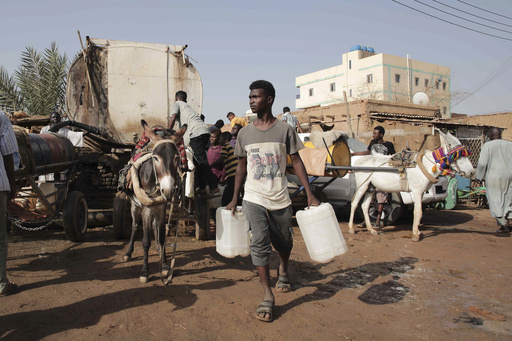
CAIRO — A severe famine is escalating in Sudan, driven by an ongoing conflict between the military and a well-known paramilitary organization, leaving devastation in its wake and resulting in the largest displacement crisis globally, according to a Tuesday report by a global hunger monitoring organization.
The Integrated Food Security Phase Classification (IPC) has identified famine conditions in five specific areas, including Sudan’s largest displacement camp, Zamzam, located in North Darfur province. Notably, this marks the first instance of famine being reported in Zamzam since August.
The extensive violence has led to unparalleled levels of displacement and has severely impacted the economy. It has caused many farmers to abandon their fields, leading to instances of looting and the destruction of food stocks, according to the report.
In addition to Zamzam camp, which accommodates more than 400,000 individuals, famine conditions have been noted in two other displacement camps, namely Abu Shouk and al-Salam, also in North Darfur, as well as in the Western Nuba Mountains. Furthermore, the report anticipates that five additional areas in North Darfur, including el-Fasher, the provincial capital, may experience famine within the next six months.
Moreover, seventeen regions across the Nuba Mountains and both northern and southern parts of Darfur are also facing the risk of famine, as per the IPC’s findings. The report also suggests that certain areas in Khartoum, the capital, and the east-central Gezira Province might be experiencing famine-like situations; however, experts have not confirmed whether these areas have crossed the famine threshold due to insufficient data.
The report emphasizes that this crisis is not merely about food scarcity but encompasses a significant breakdown of health services, livelihoods, and social structures, leaving entire communities in a dire state of need. Widespread hunger is evident, with food becoming increasingly limited and prices soaring. Organizations providing aid face significant challenges in reaching those who need help the most due to access restrictions imposed by warring factions, particularly in North Darfur.
Prior to the release of the IPC’s report, Sudanese authorities stated they had halted their participation in this global monitoring initiative, as conveyed by a senior United Nations official familiar with the situation. In a letter dated December 23, Agriculture Minister Abu Baker al-Beshri criticized the IPC for producing what he termed “unreliable reports that undermine Sudan’s sovereignty and dignity.”
The ongoing war in Sudan, which has persisted for 20 months, has claimed the lives of over 24,000 individuals and forcibly displaced more than 14 million—approximately 30% of the country’s population, according to the United Nations. Approximately 3.2 million Sudanese have fled to neighboring nations, including Chad, Egypt, and South Sudan.
This conflict erupted in April 2023 when tensions between the military and the paramilitary Rapid Support Forces escalated into violence in Khartoum, subsequently spreading across the nation. Throughout this crisis, the U.N. and human rights organizations have documented numerous atrocities, including ethnically charged killings and sexual violence. The International Criminal Court is actively investigating reported war crimes and acts against humanity.
Dervla Cleary, a senior emergency and rehabilitation officer with the U.N.’s Food and Agriculture Organization, noted that around 638,000 individuals are currently experiencing conditions classified as famine.
“The situation in Sudan is truly horrific. It is intolerable in a world as advanced as ours,” she remarked.
Highlighting the urgency of the situation, the IPC report advocated for an immediate ceasefire, stating that this is the sole means to mitigate the risk of famine expanding further.
Sudan now becomes only the third country to declare famine in the last 15 years, following South Sudan and Somalia.
The IPC is a coalition of various U.N. organizations, aid agencies, and governments that rely on its monitoring for a global assessment of food and nutritional crises. The organization has similarly indicated that significant portions of the Palestinian population in Gaza are also at risk of famine.

